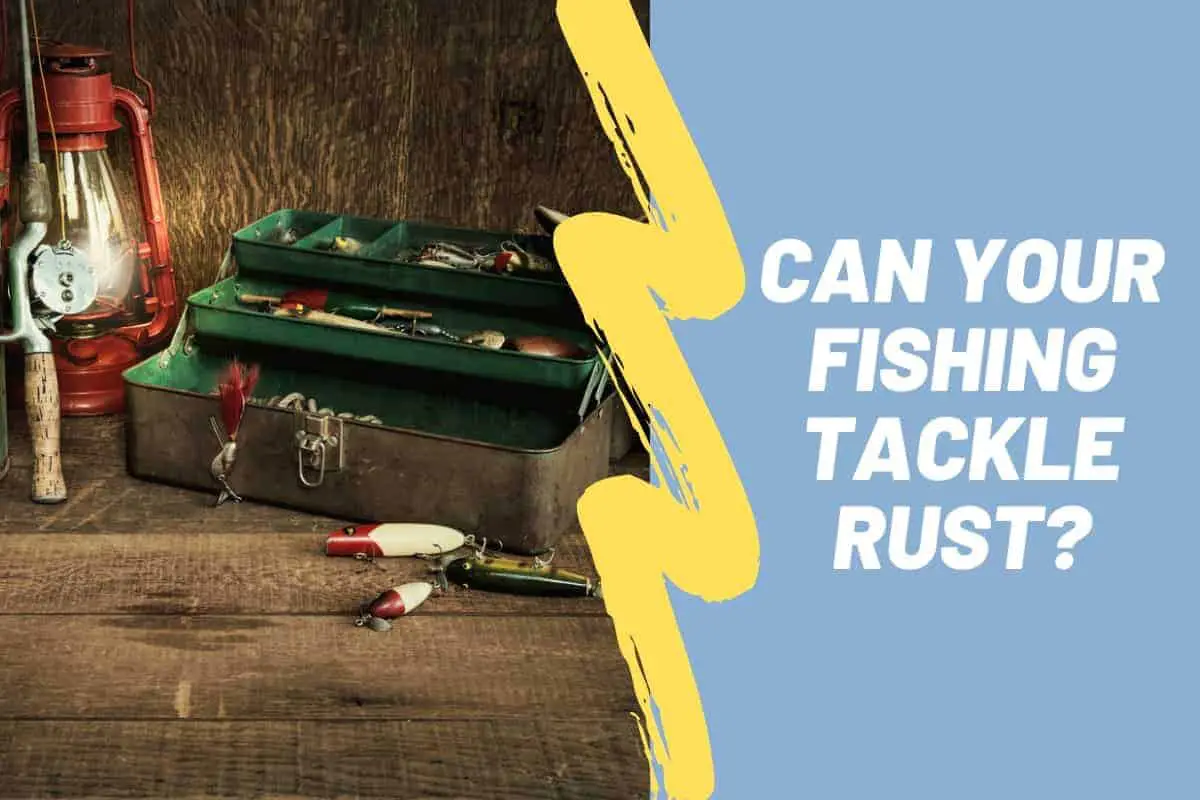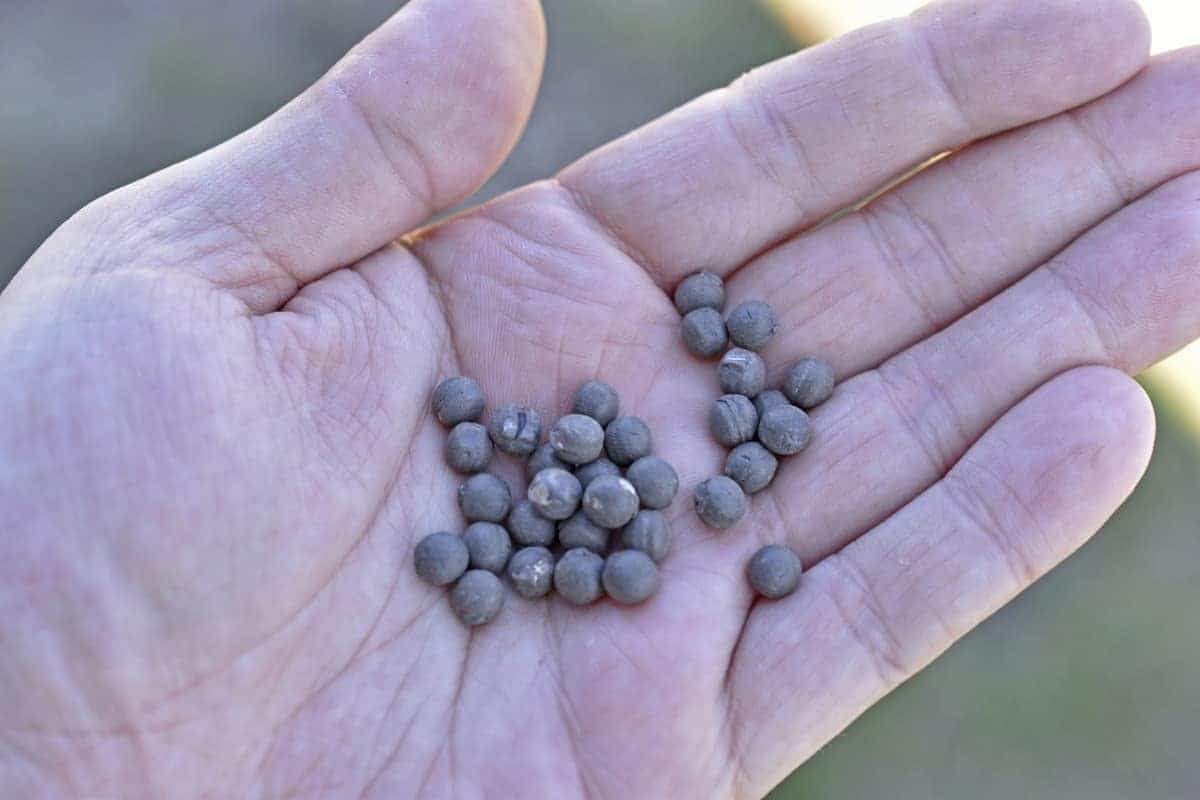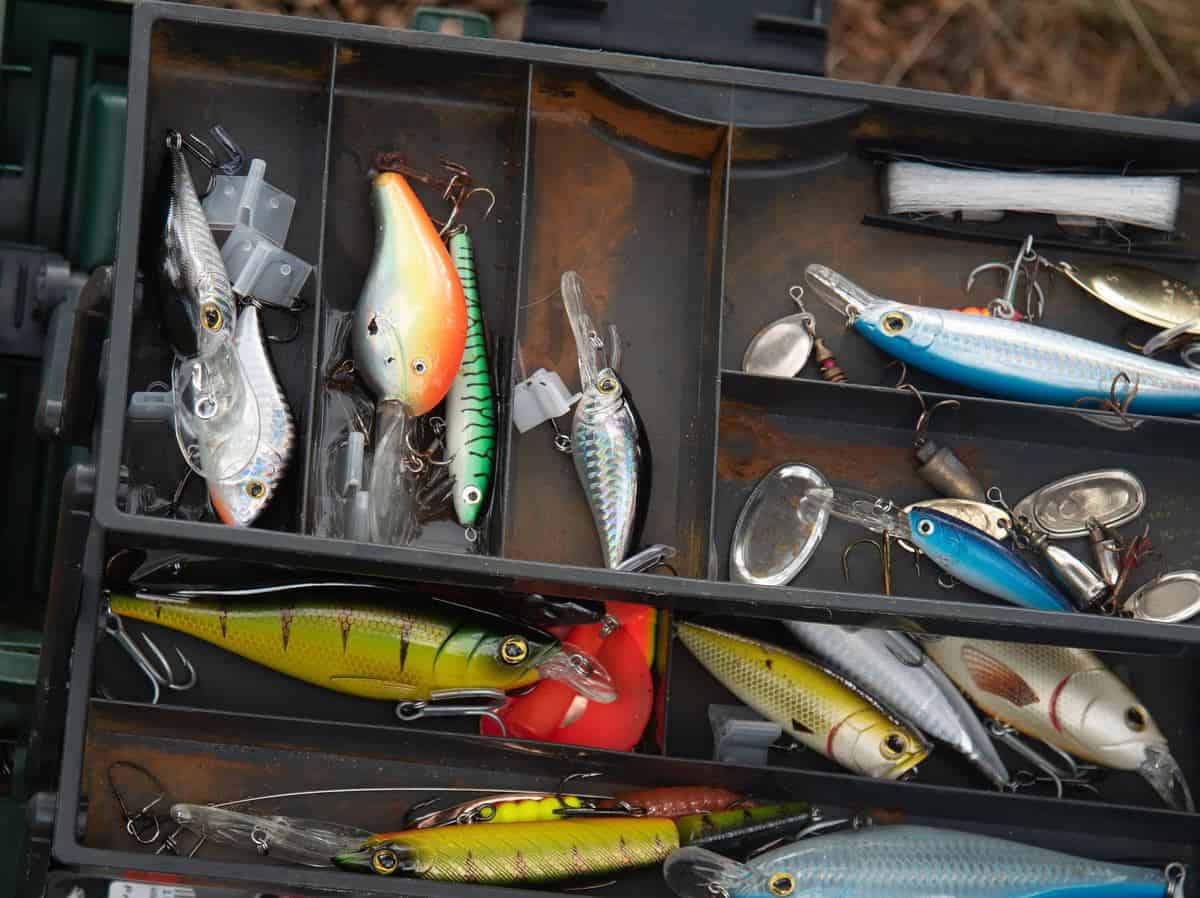
Whether you’re a novice or a seasoned pro angler, every angler has a tackle box full of fishing tackle. After using your tackle for a while, you might notice that your tackle might be getting old and rusty. But some of your tackle has more rust than others, and some tackle has no rust at all. How can this be? Don’t all fishing tackle rust?
Hooks and lures will absolutely rust because they are made from iron-based materials. The rate of rusting will increase if you’re fishing in saltwater vs freshwater or if the protective coating is damaged. Rust will occur with other iron-based tools like pliers and some knives. Other common tackle like swivels and weights will not rust.
Fishing with rusty tackle is no fun. The rust will make your hooks dull at the point and slowly erodes the strength of the hook. Not to mention, rusty fishing tackle is not good to look at and can cause stains in your tackle box.
Since your fishing hooks and lures are the most acceptable to rusting, let’s take a deeper dive into why do these hooks rust and what you can do to clean the rust off.
Why Do Hooks And Lures Start Rusting?
You might be wondering what causes hooks and lures to rust in the first place?
Rust is created by a chemical reaction between the iron molecules in a hook or lure, which reacts with the water. The hook will need to lose some of its iron molecules to react with the water for rust to form. The more rust that forms, the more iron molecules the hook loses. This reaction is called corrosion, causing the hook to lose metal over time, making it weaker.
To prevent this, all hooks and lures are protected against rusting because of a protective coating. There are five main types of coating used on hooks:
- Common Freshwater Coatings:
- Bronze Coatings
- Gold Coatings
- Nickel Coatings
- Common Saltwater Coatings:
- Black Coatings
- Blue Coatings
- Tin Coatings
If any of these coatings are damaged, it will expose the Hook’s iron-based material causing it to start rusting no matter how small the exposure is. Assuming that you kept your hooks in perfect condition and never have been physically damaged, then the coating can still lose its thickness over time. Even coatings can experience some level of corrosion even though you don’t see it, and over several years you could lose enough coating to expose the hook’s material.
Another important factor that influences the rate of rusting is the type of water you are fishing in. Saltwater is the most corrosive water to fish in, and the higher the salt content in the water, the higher the corrosion and rusting rates are. In fact, if you leave a hook in saltwater long enough, it will completely rust through. If you’re curious, I wrote an article on how long it will take for a fishing hook to dissolve.
Fishing in freshwater is far less corrosive than saltwater fishing, and your fishing hooks and tackle will last much longer than if you were fishing in saltwater.
Will Fish Bite On Rusty Hooks And Lures?
If your hooks and lures are rusty, are they still useable?
Most definitely! Fish won’t notice if a hook is rusty or not and will still bite on a rusty hook. But the pointy end of a rusty hook will be duller, making it harder to catch fish. The rust could have caused the hook to lose a sufficient amount of its strength, leading to the hook breaking.
Rusty Hooks Can Be A Health Harzard To You!
When dealing with rusty hooks, most anglers tend to forget that you can potentially get tetanus if a rusty hook cuts you.
Even though these rusty hooks are duller than hooks that are not rusted, the rusty hooks can still cut you.
If you get a cut from a rusty hook then seek medical attention right away! If you get tetanus and left untreated it can be potentially fatal.
Cleaning Rust Off Of Rusty Hooks And Lures
Fishing with a rusty hook can affect your ability to catch fish and could be a health risk for you. This is why cleaning the rust off your hooks and lures is so important. There are three main ways to clean rust from hooks and lures.
Method 1: WD40
WD40 is a water-displacing spray that works for lubricant, rust removal, and a moisture displacer. This is a super simple and inexpensive way to remove rust from your fishing hooks and lures.
Here are the steps you need to do:
- Place your rusty hooks and lures in a container
- Spray them liberally with WD40 on both sides
- Let them soak for about 2 hours or longer
- Wipe off the WD40 from the hooks and lures using paper towels or a rag. The rust should wipe right off.
Method 2: Vinegar, Baking Soda, And WD40
If method 1 doesn’t work for you, then method 2 will definitely work!
As many people know, vinegar and baking soda are great natural cleaners and rust removers. This method may take longer than the other methods, but it will have your hooks and lures super clean.
Here are the steps you need to do:
- Soak your hooks and lures in vinegar for a few hours (Overnight is best).
- Pull out the hooks and lures from the vinegar and wipe the rust off using a paper towel or rag.
- If there is still rust, then make a paste by adding a small amount of water to some baking soda.
- Apply the paste on the hooks and lures and let it sit for a few hours.
- Half way through the soaking, scrub the hooks and lures using a old toothbrush to workin the paste.
- Rinse off the paste and spray the hooks and lures with some WD40 and let it sit for 1 hour.
- Wipe off the WD40 and be amazed how clean your hooks and lures are now.
Method 3: OSPHO
If the first two methods have not worked for whatever reason, or you don’t want to wait for a few hours to clean the rust off of your hooks and lures, then this method will for sure work for you.
OSPHO cleans the rust off and stops the rusting chemical reaction in its tracks by neutralizing the rust and stopping it from progressing. It’s perfect for hooks and lures that are highly corroded. It’s very simple and effective, but the product can sometimes be hard to find. But, I did the hard work for you and I was able to find the [sherpa id=”62a9f536″] product on Amazon.
Here are the steps you need to do:
- Lay your rusted hooks and lures out on a paper towel and generously spray the OSPHO over them.
- Let them soak for 1-2 hours.
- After lay them on some clean paper towels and allow them to air dry overnight.
If you try this method, your tackle will be good as new when you are finished!

Can Fishing Weights (Sinkers) Rust?
Now that we talked about hooks and lures rusting, you may be curious if some of your other fishing tackle could rust as well. When anglers look at fishing weights, they look at a chunk of metal, so it is quite common to hear the question, “Can fishing weights rust?“.
The majority of fishing sinkers are made from lead which doesn’t rust. But these sinkers form a whitish powder called Lead Oxide which can be potentially harmful to humans if you’re not careful. Lead Oxide is created on the surface of the sinkers when the weights are stored in a container with poor air circulation.
Safety Tips On Handling Weights With Lead Oxide On It
Lead oxide can be harmful to anyone but especially children. If you inhale or ingest lead oxide, it can lead to some severe health conditions such as lead poisoning, cancer, and in extreme cases, even death.
The best safety precaution you can take is cleaning your fishing weights when you notice a whitish powder forming on the outside. But if you’re touching your fishing weights and notice a whitish powder on them, then it’s best to wash your hand as soon as you’re done handling the weight before you accidentally touch your eyes, mouth, nose, or food.
How To CleanLead Oxide Off From Your Sinkers
Cleaning your lead fishing weights is relatively simple. The most effective way to clean your fishing weights are:
- Add your sinkers in a solution of one part vinegar and one part water. Let them soak overnight.
- Rinse and dry the sinkers.
- Mix baking soda and water, then apply it to the sinkers and let them soak for at least an hour. This helps to neutralize the acid from the vinegar.
- Rinse and dry them again, then apply WD40. Let them soak for another hour.
- Wipe off the WD40, and they are ready to use again!
Do Fishing Swivels Rust?
Swivels are less likely to rust than other types of fishing equipment. They are typically made from nickel-plated brass or stainless steel, both of which are materials that don’t corrode.
Even though swivels are made from material that doesn’t rust, you can still run into a case where they might rust a bit. When this happens, it can be challenging to clean your swivels because of the bearings inside the swivel.
When you notice rust starting to form on your swivels, it’s best to throw them away and get new ones.
Can Your Fishing Tools Rust?
There are countless amounts of tools and accessories that you can purchase for fishing, such as a pocket knife, pliers, and even digital scales. But, what you will eventually notice is that most of these tools will start rusting. The items that will start rusting will be items that are made from material that contains iron.
Most types of steel contains iron and will rust. Stainless steel is a common type of steel that has no iron and won’t rust.
Most of these tools and accessories are made from various types of steel. Steel rusts very easily, especially when exposed to saltwater and not dried properly.
How To Clean Rust Off Your Tools?
If you notice some rust on your tools, you can use any previously discussed methods, such as WD40, OSPHO, vinegar, baking soda, and WD40. These methods will work perfectly, but there are also a couple of other methods you can use.
You can combine lemon or lime juice with salt. Soak the tools in this mixture for about 4 hours. Afterwards, scrub off any remaining rust with a metal wire scrubber.
Another excellent method is using Coca-Cola. Pour your Coca-Cola on your tools, then scrub off the rust with a metal wire scrubber. It is an inexpensive method, and you may already have it in your home!

How To Clean Rust Out Of A Tackle Box
One of the most annoying things about rusting tackle is the mess it can create. Flakes of rust can chip away from your tackle and cause a mess. You can stain your tackle box if some water got inside, and the rust can turn the water to a brown/reddish colour.
But there are a few different ways to clean rust from your tackle box. Start by removing everything out of the tackle box and thoroughly washing it with soap and warm water. Afterwards, spray it with WD40 and let it soak for an hour and wipe away the excess.
For a quicker method, you could take a Q-tip and dip it in acetone, then clean any areas that have rust on them. You could also use the OSPHO method.
How To Keep Fishing Tackle From Rusting In A Tackle Box
As we know, rust forms on our tackle when stored in a tackle box with moisture in it and has poor air circulation. The good news is that you can take steps to prevent or minimize the chances of rusting starting or getting worse.
When you get home from a fishing trip, it’s a good idea to open up your tackle box and let it air out overnight.
Another thing you can do is rinse any fishing equipment that has been in saltwater with freshwater. The saltwater will cause your tackle to rust even faster than freshwater. By washing off the salt then letting your tackle dry, you will lower the risk of corrosion.
It’s also wise to store your saltwater tackle and your freshwater tackle in separate tackle boxes.
If It Rusts, It’s Not A Bust
Fishing is an enjoyable activity to do on your own or with your loved ones. It’s an excellent way to get outside and enjoy nature! But with all the tools and accessories you use while fishing, you’re bound to experience some rust at some point.
Many people think that as soon as their equipment begins to rust, it should be thrown out and replaced, but that is not the case. There are numerous methods out there for cleaning rust off of your tackle. So next time you notice some rust, don’t throw out your equipment; try out one of these solutions and preventative measures. You’ll be astounded at how well they can work!
Happy Fishing and Tight Lines!
